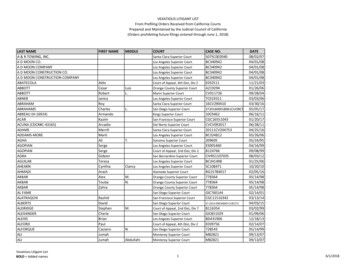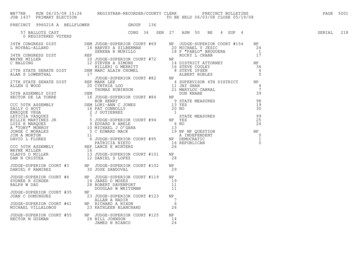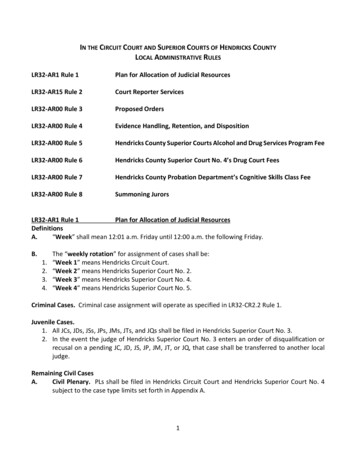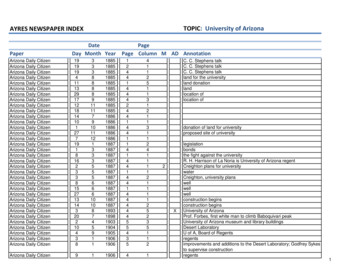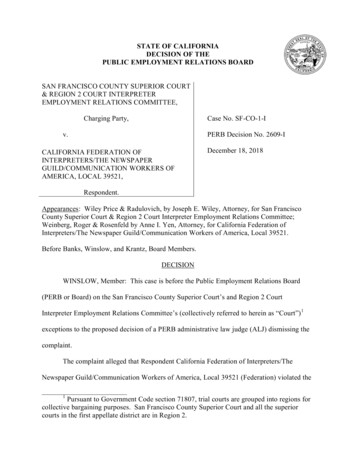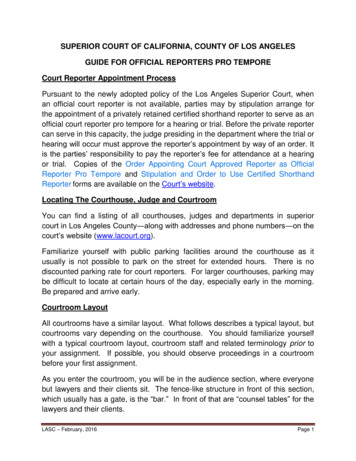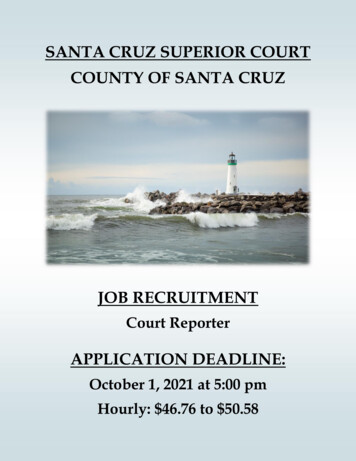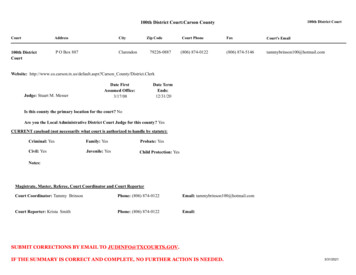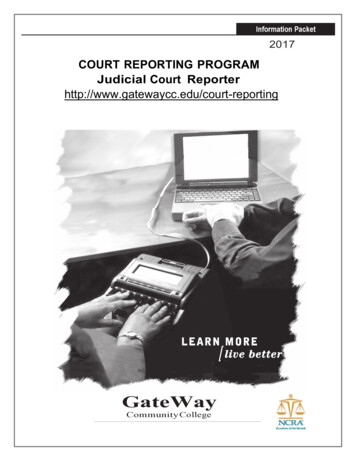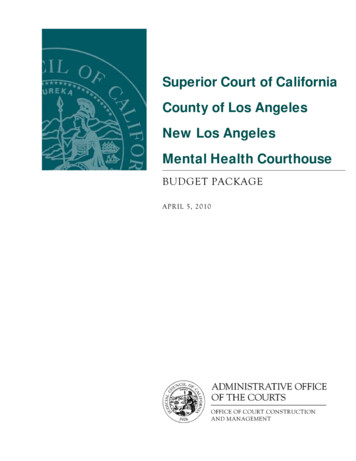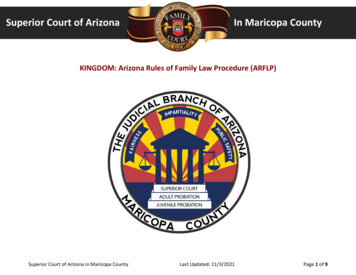
Transcription
Superior Court of ArizonaIn Maricopa CountyKINGDOM: Arizona Rules of Family Law Procedure (ARFLP)Superior Court of Arizona in Maricopa CountyLast Updated: 11/3/2021Page 1 of 9
KINGDOM: Arizona Rules of Family Law Procedure (ARFLP)NOTESSuperior Court of Arizona in Maricopa CountyRules Governing Family Law ProceedingsIt is important to have a working knowledge of the rules that govern family lawproceedings. Historical Use of Rules of Civil ProcedureHistorically, all family law proceedings were governed by the Arizona Rules ofCivil Procedure. And in most circumstances, those rules sufficed. The Impact of Disclosure RulesHowever, when the disclosure rules in Arizona were first adopted, they werewritten in a fashion that was applicable to a civil dispute, where one party wasmaking a specific claim against the other. This created great challenges for thefamily law practitioners as family court cases involved numerous claims notarising from or associated with a single occurrence and the needs fordisclosure were far different in a family court case than the kind of disclosurerequired in a general civil case. Further, there was gross inconsistency in howparties were meeting the disclosure requirements. Arizona Rules of Family Law Procedure (“ARFLP”)The problems with the disclosure rules, as written, combined with otherfactors led to the Arizona Supreme Court adopting a completely separate setof rules to govern family law proceedings. No Shortcuts: They must be readThere is no substitute to reading the rules and understanding their structurealong with their substance.Through this training, the goal shall be on highlighting certain specific rulesthrough some frequently asked questions.Last Updated: 11/3/2021Page 2 of 9
NOTESSuperior Court of Arizona in Maricopa County Rule 2 Applicability of the Arizona Rules of EvidenceHow do the Rules of Evidence intersect with Family Court Proceedings?Strict application of the rules of evidence creates challenges for the family courtjudge since there is a mandate to ensure that property is divided equitably andthat children’s best interests are protected. This led to the development of Rule2. Below is Rule 2. It is suggested that you review it carefully along with thecorresponding rules of evidence that are cited within this rule. You will likelyfind that where the rules of evidence are relaxed, it is because there issomething inherently reliable about the evidence that allows for it to beconsidered.Rule 2. Applicability of the Arizona Rules of Evidence(a) Effect of a Rule 2(a) Notice; Time for Filing. Any party may file a notice torequire compliance with the Arizona Rules of Evidence at a hearing or trial. Aparty must file the notice at least 45 days before the hearing or trial, or byanother date set by the court. If a hearing or trial is set fewer than 60 days inadvance, the notice is deemed timely if a party files it within a reasonable timeafter the party is notified of the hearing or trial date.(b) Effect of No Notice. If no party files a timely notice under (a),(1) Arizona Rules of Evidence 602, 801-807, 901-903, and 1002-1005 do notapply; and(2) the other Rules of Evidence, including Rule 403, still apply, except asprovided in sections (c) and (d).(c) Records of Regularly Conducted Activity. Regardless of whether a notice wasfiled, a record of regularly conducted activity as defined in Rule 803(6) of theArizona Rules of Evidence or reports prepared pursuant to Rules 68 or 73 maybe admitted into evidence without testimony of a custodian or other qualifiedwitness regarding its authenticity if the record is relevant, reliable, and wastimely disclosed.Last Updated: 11/3/2021Page 3 of 9
NOTESSuperior Court of Arizona in Maricopa County(d) Affidavits of Financial Information. Any Affidavit of Financial Informationrequired to be filed or served may be considered as evidence if offered asevidence by a party and admitted into evidence by the court. Rule 22. Conduct of ProceedingsI have limited time and a heavy case load. Can I limit the length of the contestedhearings?YES! Case management is one of the challenges for a judicial officer assigned tofamily court. It will require reasonable limits on the length of any contestedproceeding.Rule 22. Conduct of Proceedings(a) Time Limits. The court may impose reasonable time limits appropriate to theproceedings. A party may request additional time.There is authority to limit the length of proceedings. This authority exists notonly through the rule, but through case law as well. The key is to ensure thatthere was adequate notice to the parties of the time constraints that will beimposed upon them at the contested hearing and that the constraints arereasonable given the issues presented in the case. Rule 49 DisclosureARFLP was adopted, at least in part, to tailor disclosure and discovery rules tofamily law proceedings. Are there specific rules relating to disclosure?As noted earlier, one of the driving forces behind the adoption of rules of familyproceedings was the difficulty in applying the disclosure provisions of the civilrules to family proceedings.Last Updated: 11/3/2021Page 4 of 9
NOTESSuperior Court of Arizona in Maricopa CountyRules 49 is the family law version of Rule 26.1 of the civil rules.Rule 49 is the disclosure rule. It cannot be stressed strongly enough how thecompliance or lack of compliance with this rule can drive family court litigation. Rule 69 Binding AgreementsWhat rule regulates agreements reached between the parties?Partial and full agreements are reached in a majority of cases. There are ties inwhich the parties contest whether and to what extent a binding agreement hasbeen reached.Rule 69. Binding Agreements(a) Validity. An agreement between the parties is valid and binding on theparties if:(1) the agreement is in writing and signed by the parties personally or bycounsel on a party's behalf;(2) the agreement's terms are stated on the record before a judge,commissioner, judge pro tempore, or court reporter; or(3) the agreement's terms are stated in an audio recording made before amediator or a settlement conference officer appointed by the court.(b) Court Approval. An agreement under this rule is not binding on the courtuntil it is submitted to and approved by the court as provided by law.(c) Challenge to Validity. An agreement under section (a) is presumed valid, anda party who challenges the validity of an agreement has the burden to proveany defect in the agreement. Under A.R.S. § 25-324, the court may award aparty the costs and expenses of maintaining or defending a challenge to thevalidity of an agreement that was made in accordance with this rule.This rule expanded what was previously the method for making an agreementbinding under Rule 80(d) of the rules of civil procedure.Last Updated: 11/3/2021Page 5 of 9
NOTESSuperior Court of Arizona in Maricopa Countyo CAVEAT: Even if the agreement is binding upon the parties, ARS Section25-317(B) requires the court to ensure that the agreement is not unfair,ARS Section 25-403 requires the court to ensure that the agreement is inthe best interests of the child, and the Child Support Guidelines requirecompliance with its results.In most civil cases, the court is only asked to determine whether the agreementis binding. If it is, in almost all circumstances the court will enter ordersconsistent with the binding agreement. However, in family proceedings, thecourt must still ensure equity regarding property division, compliance with theGuidelines for child support and parenting provisions that are in the bestinterests of a child. This is what is behind the provisions of subsection B of thisrule. Rules That Focus on ChildrenAre there rules that focus on children?As a further illustration of the need to be governed by something other than therules of civil procedure, ARFLP include a number of rules relating to involvementof children in the proceedingso ARFLP Rule 10 - Representation of children in family law proceedings[See also ARS Section 25-321]. This rule involves both child attorneys andbest interest attorneys.o ARFLP Rule 12 – Interviewing children - There is also a specific rulerelating to interviewing children. This can be important for a number ofreasons, including determining the wishes of a child, which is a factorunder ARS Section 25-403. The rule is very specific as to the method ofinterviewing the children and as to the record to be maintained.Last Updated: 11/3/2021Page 6 of 9
NOTESSuperior Court of Arizona in Maricopa Countyo ARFLP Rule 5.1 – What if a child is subject to both a family courtproceeding and a dependency proceeding in juvenile court? There arecases where a family court proceeding also end up in a juvenile courtdependency proceeding. In fact, the family court judge may be the onewho takes the steps to have the juvenile action initiated because neitherparent appears to be capable of meeting the needs of the child. This ruleinstructs us to transfer the case to the juvenile court. Rule 48 Temporary Orders Without NoticeEmergency motions are most often (but not exclusively) filed for issues relatingto children. What rule covers those proceedings?Rule 48. Temporary Orders Without Notice(a) Filing and Timing. A party may request temporary orders without notice byfiling a verified motion, along with a proposed form of orders and a notice ofhearing on the motion. A motion may be filed at the same time or after filing aninitial pre-decree or post-decree petition.(b) Grounds. A court may grant temporary orders without written or oral noticeto an adverse party or that party's attorney only if the verified motion:(1) clearly shows by specific facts that if an order is not issued before theadverse party can be heard, the moving party or a minor child of the party willbe irreparably injured, or irreparable injury, loss, or damage will result to theseparate or community property of the moving party; and(2) the moving party or attorney provides written certification of the efforts togive notice to the other party, or why giving notice should not be required.(c) Orders. Temporary orders without notice must specify the injury, loss, ordamage and why it is irreparable, and state why the court granted the orderswithout notice. Temporary orders expire at the date and time set for hearing onthe motion unless the court extends the time for good cause.Last Updated: 11/3/2021Page 7 of 9
NOTESSuperior Court of Arizona in Maricopa County(d) Hearing. An evidentiary hearing must be set on the motion not later than 10days after the order's entry, unless the court extends the time for good cause.The nonmoving party may request an earlier evidentiary hearing withreasonable notice as the court directs.Rule 48 controls. In most circumstances, judges will not grant the ex parte reliefbut will set the matter for an accelerated proceeding. Rule 78(c) Final JudgmentWhat causes many family court appeals to be remanded back to the SuperiorCourt for further proceedings?For an order to be subject to appeal, it must be a final order that resolves allissues. If magical language does not appear in the final order, the Court ofAppeals will remand the case with instructions to enter a final, appealableorder.Below is a suggestion as to the “magical language.” Be sure that you includesomething along these lines in your final orders or judgments. Also, if there areissues that remain pending before the court but you elect to make the alreadydecided issues appealable, please consider Rule 78(b).o Rule 78(c): This is a final judgment under Rule 78(c) and there are nofurther matters that remain pending before the court.Last Updated: 11/3/2021Page 8 of 9
NOTESSuperior Court of Arizona in Maricopa County Rule 91 Modification or Enforcement of a JudgmentA significant portion of a family court case load involves post decreeproceedings. Are there special rules that govern those proceedings?Without attempting to assign percentages, it is fair to say that a significantportion of the case load in family court involves post-decree proceedings. Hereare the rules that are specific to those proceedings.Rule 91. Modification or Enforcement of a JudgmentRule 91.1. Post–Judgment Petition to Modify Spousal Maintenance or ChildSupportRule 91.2. Post–Judgment Petition to Enforce Spousal Maintenance or ChildSupportRule 91.3. Post–Judgment Petition to Modify Legal Decision Making orParenting TimeRule 91.4. Post–Judgment Petition to Relocate or Prevent RelocationRule 91.5. Post–Judgment Petition for Enforcement of Legal Decision–Making or Parenting Time; Warrant to Take Physical CustodyRule 91.6. Other Post–Judgment PetitionsLast Updated: 11/3/2021Page 9 of 9
Rules Governing Family Law Proceedings It is important to have a working knowledge of the rules that govern family law proceedings. Historical Use of Rules of Civil Procedure Historically, all family law proceedings were governed by the Arizona Rules of Civil Procedure. And in most circumstances, those rules sufficed.
